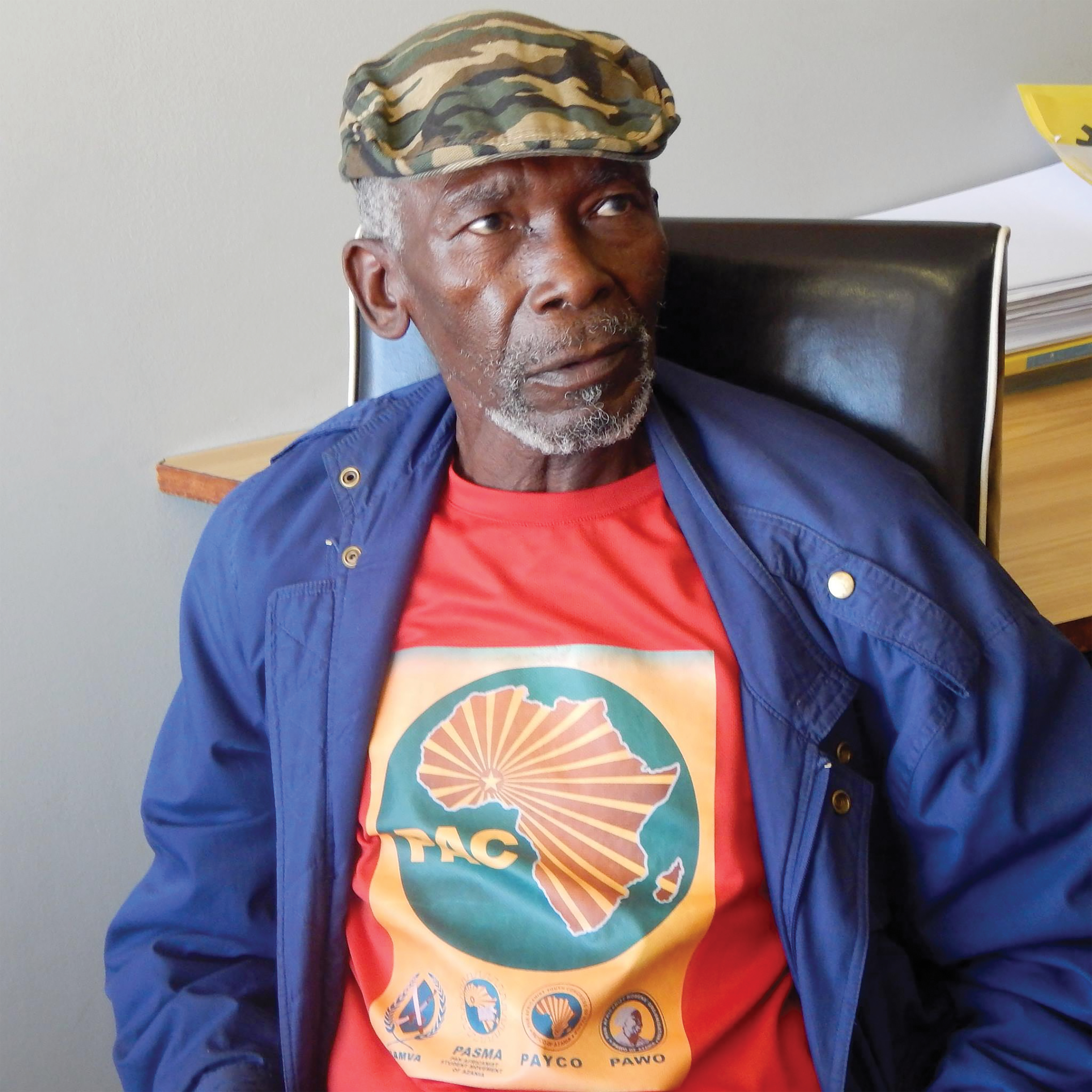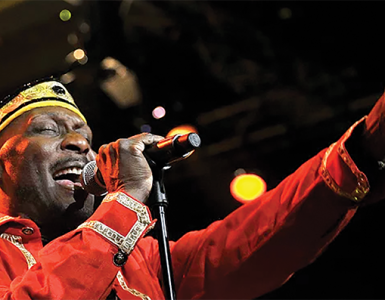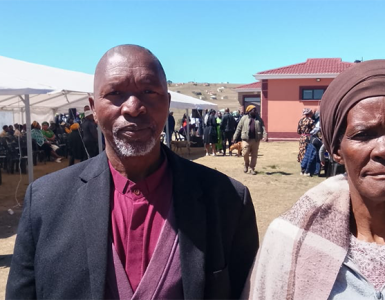SHADOW: His lonely death last week at Pretoria’s Garankuwa Hospital, in a severe state of neglect and malnourishment, was a far cry from the picture of a radical farm worker, who killed four members of white Free State family, two years before the advent of democratic South Africa in the 1990s…
By Sonti Maseko
In 1991, farm worker Gabriel Diphaphang Mahakwe, armed with a firearm, shot and killed four members of a white family at a farm Groot Stryd, outside Bloemfontein, in the Free State.
In a statement following his arrest, he defiantly told the court he did it to cut the hand of apartheid. “As I shot them, I was calling “Maloyi, Africa must return”, I was chopping the hand of apartheid”.
Mahakwe, released from prison after serving 22 years in 2015 without the blaze of headlines that surrounded his trial and sentencing to death in 1990s, died at Garankuwa Hospital in the North West on Saturday last week. He was 74.
In the past eight years, Mahakwe has been quietly living a life of a recluse on a farm outside Pretoria, under parole conditions, about 500km away from his place of upbringing in the Free State.
Defiant, forceful, eloquent, Mahakwe was no stranger to the system of white policemen, magistrates, courts and the penitentiary system to follow as a result of the crime. He had been through that a few times before – a repeat offender, they said of him at the sentencing – but it seemed he didn’t care. He knew what was to come.
The trial was of little interest to him. He had demanded to be tried by a Black judge and when told by the presiding judge that there were no Black judges then, at the time in South Africa, he turned away and, shaking his head, casually went down the stairs below the dock, loudly retorting, “then I am very, very, sorry!” to a laughing audience in court. It was equally a determined, dismissive and racist white court that was intent to try him under protest.
For instance, a social worker brought in mitigation of sentence, defending her testimony in cross-examination, said one of her interviewees had been a fellow named Thabo.
“But everyone is called Thabo! (in Black townships),” the judge retorted, “that is the name you (Black) people give to every second child that is born, isn’t it?” suggesting that her report was cooked.
In turn, he used every court appearance to have an altercation with the judge. He would follow the proceedings, and, in turn, would protest in defence of his witnesses.
To that, Mahakwe would shout angrily, addressing the prosecutor and calling on the court to stop harassing the witness. It was a trying and combative trial where the court was packed daily to hear Mahakwe squaring up to the judge, talking to him directly in fluent Afrikaans, then switching to seSotho to speak through the interpreter when he was raising land dispossession and apartheid, the white establishment, colonialism and the imperialism of the western countries.
ANGRY AND UNREPENTANT
His voice was always strong, the tone defiant. He was angry and unrepentant. And yes, he loved the guns, especially the AK-47. He saw the gun as a weapon of liberation.
At one time during the court break, he had court spectators laughing as he performed with zeal a re-enactment of a machine gun and its ratt-tat-tatatt sounds, “sethunya sona sea ho hula ha monate” he would rant in seSesotho (translated into English, meaning: “The weapon directs you, pulls you on its own; so, you to keep firing!” to the delight of his supporters.
The trial was taking place against the backdrop of the 90s Third Force low-intensity state-sponsored war waged in Black townships and informal settlements. And the news of the Boipatong killings marked one instance in which Mahakwe became restless and incensed at his court appearance. It was as if his trial for multiple murders was a waste of time, that he would rather have been out there, where the attacks against defenseless Black people were taking place. He was livid, incensed by the Boipatong massacres.
During the court break he shouted from the dock, “O kile wabona motho abolaya ngwana o-mokana? (Demonstrating with his hands, the size of a toddler) ka lerumo?” “What kind of a human would kill a child, that small and uses a spear?”, referring to the Third Force killings in which young victims – including babies – were butchered.
“Kebolaile Engelbrecht wa apartheid!” (in English, I killed Engelbrecht of apartheid) he shouted at one time when sentencing procedures were in process and while the judge read out the names of his victims. His anger and bitterness were still raw, at the end of which he reminded the judge, “Wie wat lag die laaste, lag die lekkerste!” (He who laughs last, laughs best!)
With that, Mahakwe took with him the confrontation and the violence, the probable screams, fears of each of the four family members whose lives he took, the ringing shots and all the horrific death scene and began a life on death row, facing up to the fact that he was a condemned man, and would be hanged someday. But that was not to be; the political negotiations of the time to create a just settlement out of an apartheid dispensation to a democracy won him a reprieve by the Pan Africanist Congress and his sentence was commuted to life.
Later, at a PAC gathering in Vereeniging, former PAC president Letlapa Mphahlele, made a special welcome to newly released M’Afrika Gabriel Mahakwe, acknowledging his presence, to a crowd of new members, many who were hearing his name for the for the first time.
“Uyi Bhubesi, Mahakw’ uyi-Bhubesi!!!!” “Mahakwe; the Lion!!!” The chanting went on for a while until it ultimately died down.
In the place of an angry, defiant and fiery person, there stood a humble peaceful, elderly man, perhaps his graying hair giving his face that dignified stature. Healthy looking and calm, he seemed relaxed and comfortable in the presence of his people.
LAST DAYS
What became of the rest of the life of Mahakwe, leading to his lonely death last week at Garankuwa hospital, in a severe state of neglect and malnourishment? He had spent the rest of his days living in the shadow of a person under a life sentence, under the supervision of prison authorities. But how did he live the rest of his days? This question is similar to the glaring question left unanswered in the Christian Bible: What did Lazarus do with the rest of his life? Religious scholars simply put it: “the Bible doesn’t say!”
The question turns on the former liberation movements; the ANC and the PAC. Mahakwe was no longer the primary responsibility of the newly formed Correctional Services department or prison authorities, but that of the former liberation movements; after all as the saying goes; when you save a life; you own it.
Mahakwe lived and worked on a farm near Garankuwa, placed there, while he had learnt to make clothing during his time in prison. He longed to be active and play a role as he watched the political developments in the country. Politically he remained a hard wired Pan Africanist, never lost his distrust and distaste of the Charterists, about whom he would often refrain, “ ke dintho tsa ma varara, Mo Afrika” when he noted the deterioration of conditions in the lives of the majority of Black people in the country.
He longed to be active, he was highly intelligent, analytic but he once chuckled that he noted that after his release he was of use mainly around election times; when younger colleagues took him along to show him off as a shock-and-awe accompaniment to a meeting; “That man! Do you know he wiped out an entire Boer family, was sentenced to death for it!” He learnt to overlook the somewhat misuse of his life story in return to be able to be in the company of bo ma Afrika.
From time to time he made efforts to enquire about his benefits, being a former operative under the military wing of a liberation movement. But these he never received, never enjoyed. It was established last year that he was a mere recipient of a old age grant, and that was deemed sufficient in some quarters, while the widely accepted norm currently being that his status would entitle him at least to a special pension, housing, access to treatment at a military facility a standard especially for MK veterans.
When conditions allowed, he would briefly visit his family in the Free State, using lifts, riding with strangers, at great risk and taking days to reach his destination. Mahakwe lived the rest of his days peacefully. His entire demeanor was peace, he was tolerant in the face of severe and serious hardships he encountered after prison, being treated as a violent man, and would not talk about violence or situations that could trigger him to anger.
“We must remember to put Morena Jeso (Jesus Christ) first in everything we do, mo Afrika, so that He leads us in all our efforts,” he would say to me whenever we talked and shared stories about life’s difficulties. He had found peace. It was clear in his voice.
When the call came through last week, asking for Mahakwe’s relatives, I rushed to Garankuwa hospital, finding him in the early stages of death. Mahakwe had been “found” and seemed to not have eaten for days. He had been brought to hospital by an ambulance.
I could not tell whether he was still conscious, whether he could see. “Mo Afrika! Can you see me?” I called out to him. Immediately he stirred, tried to focus, but he could not speak, he had lost his ability to speak and could only make unintelligible sounds, and groans. I was not allowed to be at his bedside overnight, and had to be escorted out of the hospital by a security guard, when I could not bear to leave.
But this was after I had my final request granted, asking for Mahakwe to, at least, be put on a drip. It appeared to me that in the state of our under-resourced hospitals today, and in the middle of a cholera outbreak and shortages, it could be expected that some treatments were being rationed.
Mahakwe is to be buried this week.































